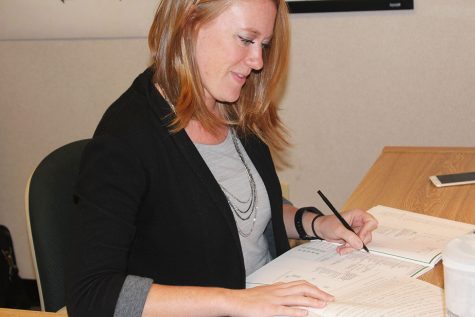Securing Insecurity
Photo by M. Thomas
Callie Hartig, a junior at NHS, socializes with friends before class starts. Throughout the last year, she has found it much easier to enjoy social situations.
October 8, 2016
It is easy to think that a human being’s most threatening predator would be the unsavory intentions of another. Truth be told, a human’s biggest threat will almost always be none other than themselves. The existence of shame and insecurity, an uncertainty or anxiety in regard to oneself, has proven to be an even more vengeful parasite than most harm that another human being could inflict on them.
Callie Hartig, a junior at NHS, is no stranger to the claim that insecurity makes on its hosts.
“When I was in middle school, I remember that all I wanted in seventh grade was to join the volleyball team,” Hartig said. “The fear of being in front of others stopped me. Just missing the ball in gym was bad enough, but missing in a game would probably have been the end of me at the time.”
The end. How can this intangible thing – insecurity – be so destructive? This thing that is barely even a thing, just a compilation of thoughts in a head? Jamie Johnson, the school psychologist at NHS, has worked with many students who have suffered consequences from their feelings of insecurity and shame.
“If levels of insecurity become high enough to debilitate a person in a way, the person may start to develop a mental health disorder,” Johnson said. “Studies are coming out all the time with new information and cognitive mapping of individuals whom have autism, depression, anxiety, and [other] social disorders.”
These levels of insecurity have to run their course: either leveling out to non-existence or peaking to the point of debilitation. One characteristic that follows along with insecurity is a one-track mind.
“No matter how many people could accept me, if there is a chance that someone wouldn’t . . . it’s all I can think about,” Hartig said. “If I could just be more confident in the way I do things, maybe I would be happier and less isolated.”
Isolation and tunnel-vision, the tendency to focus on nothing but a single thing, goal, or point of view, are only two of the most prominent, incapacitating side-effects of insecurity and shame.
“There have been several students that either have no idea of their potential or can be very timid about sharing their gifts, ideas or thoughts with others,” Johnson said. “Sometimes this can lead to bigger things like social isolation, depression, anxiety, low grades, truancy, etcetera.”
This state of mind is usually not a phenomenon that a person can simply ‘get over.’ When forcing a timid friend to ‘break out of their shell,’ It would be wise to take into consideration that their shyness may go beyond just that.
“I believe that there is help for someone to overcome feelings of insecurity,” Johnson said. “But I do recognize that there can be mental health issues that prevent this from happening independently within individuals. That is why professionals develop techniques to help these people learn to deal with daily expectations or to work toward personal goals.”
For most, insecurity does not have to be an unconquerable, lifetime feat. There are many ways to make the most unmanageable insecurity completely manageable. “Preparation, practice and repetition are things that would help most people [conquer] what they feel weak in,” Johnson said. “You can also use self-affirmations and positive self-talk to change the way that you are talking about yourself inside of your own head to build up self-esteem.”
S

Jamie Johnson, the school psychologist, grades papers in her office.
ometimes, the most beneficial words of advice come from those who have needed the advice more than anyone.
“I would tell someone else to try to remember that everyone has their strengths and weaknesses,” Hartig said. “It takes time to get good at something. Someone will always be better in some way, but the way you do things is unique to you. Find the thing that makes you special, anything. Find it.”


